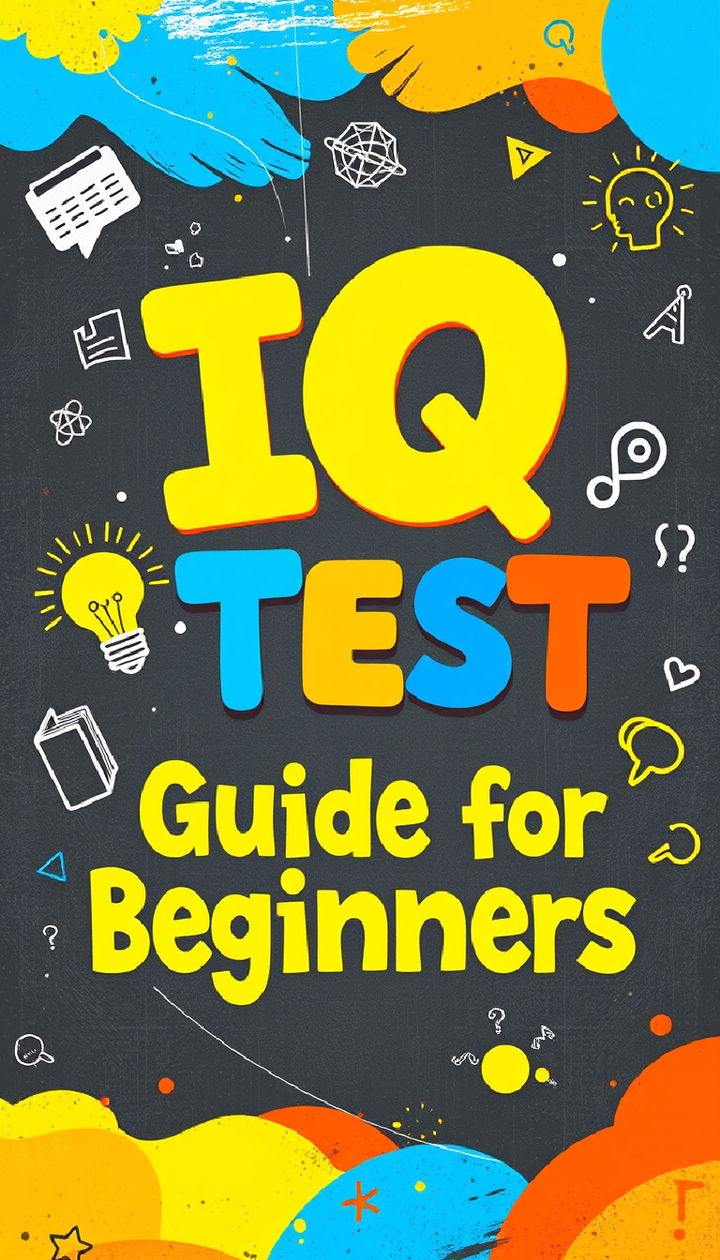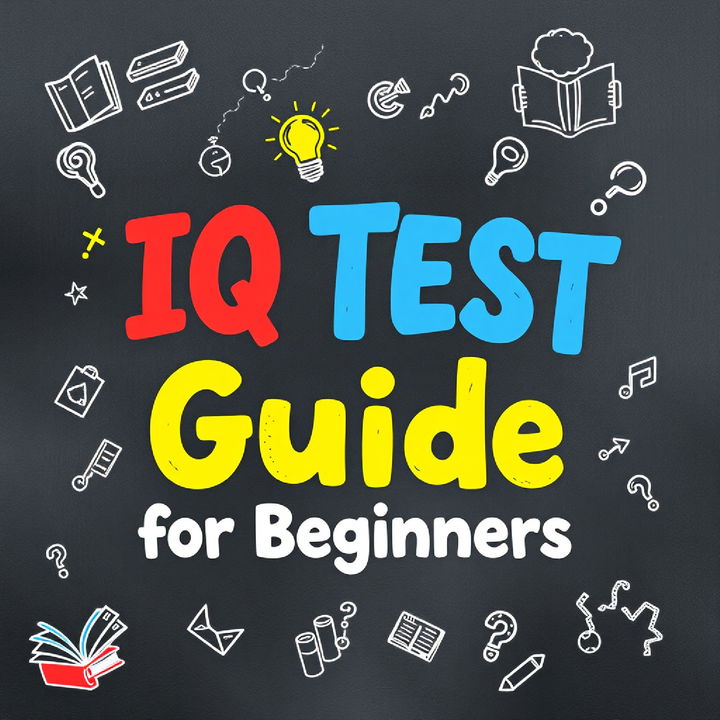Have you ever wondered about your intelligence and how it compares to others? Or perhaps you’re curious about those “IQ test” you hear about, and what they really measure. This beginner’s guide is your friendly starting point for understanding the world of IQ tests. We’ll break down what IQ is, why it matters, and how knowing your score can be a valuable tool for personal and professional growth.
IQ, or “intelligence quotient,” is a way to measure your cognitive abilities – things like problem-solving, logical reasoning, and understanding complex information. An IQ test compares your performance to others in your age group, giving you a score that reflects your relative intelligence. But it’s not just about the number. Understanding your IQ score can open doors to self-discovery, helping you identify your natural talents, areas where you might need extra support, and even potential career paths.
In this guide, we’ll take you on a step-by-step journey through the world of IQ tests. We’ll start with the basics, explaining what IQ tests are and how they work. Then, we’ll delve into the benefits of taking an IQ test, including how it can reveal your cognitive strengths and weaknesses. Finally, we’ll explore the practical applications of IQ scores in academic and professional settings. By the end, you’ll have a clear understanding of IQ tests and how they can help you unlock your full potential.

1. Understanding IQ and IQ Tests
In this section, we’ll explain the basics of IQ tests. First, we’ll define what IQ is and look at its historical background. Next, we’ll discuss the purpose and function of IQ tests, clarifying common misconceptions. Finally, we’ll trace the history of IQ testing, from its early beginnings to the modern evaluations used today.
1.1 What is IQ?
Here, I’ll define IQ and discuss its connection to cognitive abilities. We’ll also touch upon the historical development of the concept of IQ.
- Definition of IQ (Intelligence Quotient): In the simplest terms, IQ stands for “Intelligence Quotient.” It’s a numerical score that reflects a person’s cognitive abilities in relation to others their age. Think of it as a way to gauge how well your brain processes information, solves problems, and learns new things. Though not a perfect measure, IQ provides a snapshot of your intellectual capabilities.
- The Importance of IQ: While IQ isn’t the only indicator of success in life, it does play a significant role. Studies have shown that higher IQ scores are often associated with better academic performance, faster learning, and even greater career success. This is because IQ measures essential cognitive skills that are crucial in various aspects of life. Think of it as a powerful tool in your mental toolbox – the sharper the tools, the more efficiently you can tackle challenges and achieve your goals.
1.2 What is an IQ Test?
Here I provides an overview of IQ tests, including their purpose, how they work, and common misconceptions.
- Purpose and Function: An IQ test is a standardized assessment designed to measure various aspects of intelligence. These tests typically evaluate skills like logical reasoning, mathematical ability, language comprehension, and spatial awareness. There are different types of IQ tests, each with its own focus and methodology. Some tests are designed for specific age groups, while others cater to a broader range of individuals.
- How IQ Tests Work: IQ tests are typically administered by trained professionals in a controlled environment. You’ll be presented with a series of questions or tasks that gradually increase in difficulty. The questions might involve solving puzzles, identifying patterns, recalling information, or completing analogies. Your performance is then compared to a standardized sample of individuals in your age group, resulting in your IQ score.
- Common Myths and Misconceptions: There are many misconceptions surrounding IQ tests. Some people believe that IQ is the sole measure of intelligence, while others think it’s a fixed trait that cannot be improved. It’s important to remember that IQ is just one piece of the puzzle. While it does measure certain cognitive abilities, it doesn’t capture the full spectrum of human intelligence, such as emotional or social intelligence. Additionally, research suggests that IQ can be influenced by various factors, including education, environment, and personal effort.
1.3 The History of IQ Testing
Here, we’ll trace the roots of IQ testing, from ancient civilizations to the development of the first modern tests.
- Early Origins: The quest to measure intelligence is not a modern phenomenon. Even in ancient civilizations like China and Egypt, there were attempts to assess intellectual capabilities. These early methods often involved practical tasks and observations rather than standardized tests.
- Development of the First Modern IQ Tests: The birth of modern IQ testing can be traced back to the early 20th century when French psychologists Alfred Binet and Theodore Simon developed the Binet-Simon Scale. Their test aimed to identify children who might require additional educational assistance. This groundbreaking work laid the foundation for the IQ tests we know today.
- Evolution of IQ Testing: Over the years, IQ testing has undergone significant advancements. The introduction of the term “Intelligence Quotient” by German psychologist William Stern in 1912 provided a standardized way to express test results. Subsequent revisions and refinements have led to the development of various IQ tests, each with its own strengths and limitations. Today, IQ tests remain a valuable tool for understanding human intelligence, though they continue to evolve as our understanding of the brain and cognition expands.
2. Types of IQ Tests
Here I have categorize IQ tests into different types, discuss their pros and cons, and highlight a few popular tests you might encounter.
2.1 Overview of IQ Test Types
- Real IQ Tests: These are standardized assessments administered by licensed professionals, typically psychologists. They offer the most accurate and reliable measure of IQ. Real IQ tests involve a structured environment, trained administrators, and comprehensive questions designed to evaluate various cognitive abilities.
- Official IQ Tests: These are specific IQ tests recognized by educational and professional institutions. They are often used for admissions, placements, or identifying learning disabilities. Official IQ tests adhere to strict standards and norms, ensuring their validity and reliability.
- Online IQ Tests: The internet is flooded with online IQ tests, offering convenience and accessibility. However, it’s crucial to choose reputable platforms that employ valid test measures and provide accurate results.
- Free IQ Tests: While tempting, free IQ tests often come with limitations. They may lack scientific rigor, have questionable norms, or provide limited feedback. If you’re seeking a precise assessment of your IQ, consider investing in a paid, professionally administered test.
- IQ Quizzes: These are informal assessments, often found online or in magazines. They offer a fun and engaging way to test your cognitive abilities, but their results should be taken with a grain of salt. IQ quizzes are not standardized and may not accurately reflect your true IQ score.
2.2 Popular IQ Tests You Should Know About
- Stanford-Binet (SB-V): This widely used test focuses on various cognitive abilities, including verbal reasoning, abstract/visual reasoning, quantitative reasoning, and short-term memory. It’s suitable for individuals of all ages, from toddlers to adults.
- Wechsler Adult Intelligence Scale (WAIS-IV): Designed for adults aged 16 and older, this test assesses both verbal and performance intelligence. The verbal section evaluates skills like vocabulary, comprehension, and information processing, while the performance section focuses on tasks like block design, matrix reasoning, and symbol search.
- Wechsler Intelligence Scale for Children (WISC-R): Adapted for children aged 6 to 16, this test provides valuable insights into a child’s cognitive development. It assesses similar skills as the WAIS-IV but with age-appropriate questions and tasks.
- Leiter International Performance Scale: This nonverbal test is particularly useful for children with speech or hearing impairments. It evaluates intelligence through tasks that don’t require verbal communication, making it a valuable tool for assessing cognitive abilities in diverse populations.
Remember: Choosing the right IQ test depends on your individual needs and goals. If you’re seeking a comprehensive and accurate assessment, consider consulting with a qualified professional to guide you through the process.
3. When Should You Take an IQ Test?
In this section I have explained the circumstances under which taking an IQ test might be beneficial. We’ll look at signs that suggest a test could be helpful and provide guidance on how to prepare for it.
3.1 Identifying the Need for an IQ Test
Case 1: Testing for Inadequacy: If you or your child is facing significant challenges in school or social settings, an IQ test may help identify any underlying learning difficulties or cognitive delays. Some common signs to watch for include:
- Consistent struggles with academic work despite effort
- Difficulty understanding and following instructions
- Poor memory and attention span
- Challenges with social interactions and communication
Case 2: Testing for Superior Intelligence: On the other hand, an IQ test can be useful in identifying giftedness or superior intelligence. If you or your child displays these characteristics, an IQ test can confirm exceptional abilities and provide guidance for appropriate educational and developmental opportunities:
- Exceptional curiosity and a thirst for knowledge
- Advanced vocabulary and comprehension skills
- Rapid learning and problem-solving abilities
- A keen interest in complex topics and ideas
3.2 How to Prepare for an IQ Test
Environment and Mindset: Creating the right environment is crucial for optimal performance on an IQ test. Here are some tips:
- Choose a quiet and comfortable location with minimal distractions.
- Ensure good lighting and ventilation.
- Get a good night’s sleep before the test.
- Eat a healthy meal to fuel your brain.
- Approach the test with a positive and relaxed mindset.
What to Expect During the Test: Knowing what to expect can help alleviate anxiety and improve your focus.
- The test will be administered by a trained professional.
- You’ll be presented with a series of questions or tasks that gradually increase in difficulty.
- The questions might involve verbal reasoning, mathematical problems, spatial puzzles, or memory tasks.
- The test may take anywhere from one to several hours, depending on the specific test and your age.
Remember: IQ tests are just one tool for understanding your cognitive abilities. Whether you’re seeking to identify potential challenges or confirm exceptional talents, an IQ test can provide valuable insights for personal and professional growth.
4. How to Choose the Right IQ Test
Selecting the appropriate IQ test is crucial for obtaining accurate and meaningful results. In this section, we will explore the factors to consider when making your choice while safeguarding your privacy.
4.1 Factors to Consider
Credibility and Purpose:
Your Specific Needs: Start by identifying your reason for taking an IQ test. Are you seeking insights for academic pursuits, career advancement, or personal curiosity? Different tests cater to different purposes, so it’s important to choose one that aligns with your goals.
Reputable Test Provider: Opt for a test from a reputable provider with a track record of accuracy and reliability. Look for tests that have been developed by qualified professionals and adhere to standardized norms.
Ease of Access and Use:
User-Friendliness: Choose a test that’s easy to understand and navigate, especially if you’re a beginner. Clear instructions and simple language are essential for a smooth experience.
Online vs. Traditional: Consider your preferences and schedule. Online tests offer convenience and flexibility, while traditional, paper-based tests might provide a more structured environment.
Test Format and Feedback:
Test Formats: IQ tests come in various formats, such as multiple-choice, adaptive testing, or a combination of both. Consider your preferences and learning style when selecting a format.
Detailed Feedback and Interpretation: The value of an IQ test extends beyond the numerical score. Choose a test that provides detailed feedback and interpretation of your results, offering insights into your strengths, weaknesses, and potential areas for growth.
4.2 Ensuring Data Privacy and Security
Importance of Data Protection: Protecting your personal information is crucial when taking an IQ test online. Ensure that the platform you choose has robust security measures in place.
- Privacy Policy: Read the platform’s privacy policy carefully to understand how your data will be collected, used, and stored. Look for clear statements about data protection and confidentiality.
Trusted Platforms:
Transparent Practices: Choose platforms that are transparent about their data handling practices and have a clear commitment to user privacy.
Positive Reviews and Reputation: Research the platform’s reputation and read reviews from other users. This can help you gauge their trustworthiness and reliability.
By considering these factors and following these tips, you can confidently select an IQ test that is both accurate and secure.
Remember, the goal is to gain valuable insights into your cognitive abilities, so prioritize credibility, user-friendliness, and data protection when making your choice.

5. IQ Score Ranges and What They Mean
This section will demystify IQ scores, explaining the different ranges and their implications. We’ll also discuss how IQ can impact various aspects of life and its limitations.
5.1 Understanding IQ Score Ranges
IQ Score Table:
| IQ Range | Description |
|---|---|
| Below 70 | Intellectual Disability |
| 70-79 | Borderline Intellectual Functioning |
| 80-89 | Low Average |
| 90-109 | Average |
| 110-119 | High Average |
| 120-129 | Superior |
| 130-139 | Gifted |
| 140 and above | Highly Gifted or Genius |
Explanation of Each Range:
- Below 70: This range typically indicates significant intellectual challenges, requiring specialized support and interventions.
- 70-79: Individuals in this range may face learning difficulties and require additional support in academic and daily living skills.
- 80-89: This range falls within the low average category, suggesting individuals may need some extra assistance in certain areas but can generally function independently.
- 90-109: This is the average range, encompassing the majority of the population. Individuals in this range typically have no significant cognitive impairments and can succeed in various fields with appropriate effort and support.
- 110-119: This range signifies above-average intelligence. Individuals in this range often excel academically and may demonstrate advanced problem-solving and learning abilities.
- 120-129: This range is considered superior, indicating individuals possess strong cognitive skills and a high capacity for learning. They may find success in demanding academic or professional fields.
- 130-139: This range represents giftedness, suggesting exceptional intellectual abilities. Individuals in this range often display advanced reasoning, creativity, and a deep understanding of complex concepts.
- 140 and above: This range signifies highly gifted or genius-level intelligence. Individuals in this range demonstrate extraordinary intellectual capabilities and may make significant contributions to their chosen fields.
What is a Good IQ Score?
The definition of a “good” IQ score is subjective and depends on the context. In general, scores within the average range (90-109) are considered adequate for most everyday activities and professions. However, certain fields, such as academia or highly specialized professions, may require higher scores. It’s essential to remember that IQ is just one measure of intelligence, and other factors like emotional intelligence, creativity, and motivation also play a crucial role in success.
5.2 The Impact of IQ on Daily Life
- How IQ Influences Education and Career: IQ can significantly influence academic achievement and professional success. Individuals with higher IQ scores tend to learn faster, grasp complex concepts more readily, and excel in problem-solving tasks. This can translate to better grades, higher education attainment, and greater opportunities in demanding careers.
- The Potential Advantages of a High IQ in Competitive Environments: In competitive fields like academia, research, or certain professions, a high IQ can provide a distinct advantage. The ability to think critically, analyze information quickly, and solve problems efficiently can set individuals apart and lead to greater success.
- Limitations of IQ Scores: While IQ is a valuable indicator of cognitive abilities, it’s crucial to remember its limitations.
- Not the Sole Indicator: IQ doesn’t measure all aspects of intelligence, such as emotional intelligence, creativity, or social skills. These factors are equally important for overall success and well-being.
- Environmental and Personal Factors: IQ scores can be influenced by various factors, including education, socioeconomic background, and personal motivation. A high IQ doesn’t guarantee success, and a lower IQ doesn’t preclude it.
Understanding your IQ score can provide valuable insights into your cognitive strengths and potential areas for growth. However, it’s essential to view IQ as one piece of the puzzle, not the whole picture.
7. Common Questions About IQ Tests
Discover answers to 7 common questions about IQ tests, including their accuracy, purpose, and what they really measure.
Is IQ Genetic?
While genetics play a significant role in determining IQ, it’s not the sole factor. Research suggests that about 50-80% of IQ variance is attributable to genetic factors. However, environmental influences such as education, nutrition, and socioeconomic status also contribute significantly to a person’s intellectual development. Think of it like a plant: its genetic makeup determines its potential height, but proper care and nourishment are essential for it to reach its full potential.
Can Your IQ Change?
Yes, your IQ can change over time, especially during childhood and adolescence when the brain is undergoing rapid development. Studies have shown that with proper stimulation and learning opportunities, individuals can experience significant improvements in their IQ scores. However, as we age, our IQ tends to stabilize, with changes becoming less pronounced.
How Can I Improve My IQ?
While drastic increases in IQ might be challenging, there are several ways to boost your cognitive abilities and potentially improve your score. Engaging in brain-training activities, such as puzzles, strategy games, and learning new skills, can help strengthen neural connections and enhance cognitive function. Additionally, maintaining a healthy lifestyle with regular exercise, a balanced diet, and sufficient sleep is crucial for optimal brain health.
Are IQ Tests Accurate?
IQ tests are generally considered reliable and valid measures of cognitive abilities. They have been standardized and normed based on large population samples, ensuring that scores are comparable across individuals. However, it’s important to remember that IQ tests are not infallible. Factors like test anxiety, cultural bias, and individual differences can affect performance and potentially lead to inaccurate results.
What Kinds of Questions Are on an IQ Test?
IQ tests typically consist of a variety of questions designed to assess different cognitive skills. You can expect to encounter questions that involve:
- Logical Reasoning: These questions might ask you to identify patterns, solve analogies, or complete sequences.
- Mathematical Skills: You may be presented with numerical problems, calculations, or word problems that test your mathematical aptitude.
- Language Abilities: These questions assess your vocabulary, comprehension, and ability to express ideas clearly.
- Spatial Reasoning: You might be asked to visualize and manipulate objects in space or identify relationships between shapes.
- Memory and Attention: Some questions may require you to memorize information, recall details, or focus on specific tasks.
Can I Retake an IQ Test?
Yes, you can retake an IQ test, but it’s recommended to wait at least six months between attempts. This allows time for your cognitive abilities to potentially develop further or for any test anxiety to subside. It’s important to note that your score might vary slightly between attempts due to factors like practice effects or changes in your emotional state.
What IQ is Considered Genius?
Generally, an IQ score of 140 or above is considered to be in the “genius” range. This represents the top 0.1% of the population. Famous individuals with high IQs include Albert Einstein, Stephen Hawking, and Leonardo da Vinci. However, it’s important to remember that genius is not solely defined by IQ. It also encompasses exceptional creativity, originality, and the ability to make significant contributions to society.
Conclusion
In this guide, we’ve explored the world of IQ tests, from their definition and history to the various types available and how to choose the right one for you. We’ve also delved into understanding IQ scores, their impact on daily life, and addressed common questions about IQ testing.
Taking an IQ test can be a valuable experience, offering insights into your cognitive strengths and weaknesses, guiding your academic and professional choices, and even fostering personal growth. It’s a tool for self-discovery, empowering you to understand your intellectual potential and make informed decisions about your future.
So, are you ready to unlock your cognitive potential? Don’t hesitate to take the plunge and explore the fascinating world of your own intelligence. Embrace the opportunity to learn more about yourself, challenge your mind, and embark on a journey of lifelong learning and growth. Remember, knowledge is power, and understanding your IQ is the first step towards unleashing your full potential.




